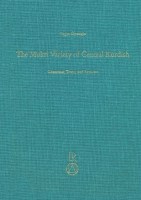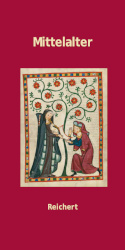Search
The Mukri Variety of Central Kurdish
Grammar, Texts, and Lexicon
2016
17.0 x 24.0 cm, 304 p., 3 illustrations b/w, with CD, cloth
ISBN: 9783954901326
go to ebook version
17.0 x 24.0 cm, 304 p., 3 illustrations b/w, with CD, cloth
110,00 €
ISBN: 9783954901326
go to ebook version
Short Description
This volume presents the documentation and description of the Mukri variety of the Central Kurdish, spoken in north western Iran. The volume contains background information on the dialect and the speech community, ten texts with English translations, two interlinear morphemic glossed texts, and a grammatical description and lexicon based on the author’s field work. Audio recordings of the texts are included on a CD.Description
This book is a grammatical description of the Mukri variety of Central Kurdish accompanied by a collection of spoken texts and lexicon. Central Kurdish or Sorani is a variety of Kurdish, a West Iranian language, spoken in Iraqi Kurdistan and northwest Iran by about 5 million people. The Mukri dialect of Central Kurdish is spoken by about one million people in the cultural-historical region of Mukriyan in northwest Iran, with the city of Mahabad at its center.The book is divided into five chapters as Introduction, Grammatical Description, Annotated Texts, Parallel Texts and Translations, Lexicon. The introductory chapter describes the language and the speech community, Central Kurdish dialectology, previous research on Mukri and Cetral Kurdish, the fieldwork and the text corpus of the research. The grammar of Mukri Central Kurdish (112 pages) provides a basic description of the phonology and morphosyntax of the variety. Under phonology, the phonemic system of the dialect is presented, illustrating the distinctiveness of the phonemes and important allophonic variation; an overview of phonotactics is provided; stress-assignment pattern is illustrated; a number of salient morphophonemic processes in Mukri phonology are discussed. Under morphosyntax, parts of speech and their morphology are described under individual sections, the syntax of the noun phrase, clausal syntax and clause types, as well as complex sentences are discussed. The grammatical description is undertaken from a typologically-oriented documentary approach, based on the author’s fieldwork and text corpus.
The volume contains ten parallel texts with English translations, two of which also morphemically-glossed. The texts represent the oral literature of Mukri Central Kurdish and include folktales, fairy tales and anecdotes. They are accompanied by extensive metadata on the narrators and setting as well as cultural and linguistic annotations. High quality audio files of the texts are made available in the CD accompanying the book. The lexicon at the end of the book contains a selection of lexical items from the corpus of the research.
This volume provides the most detailed grammatical description of single variety of Kurdish from a documentary linguistics approach. For its first-hand ethnographic material recorded in the field and the up-to-date methodology of linguistic analysis, this book can be of interest for the historical (Iranian) and general linguists as well as the students of oral literatures in Iran.
Biographical Note
Ergin Öpengin was born in 1985 in Hakkari, Turkey. In 2003, he obtained his PhD in Linguistics from University of Sorbonne Nouvelle and University of Bamberg. In 2013 – 2014, he taught at the Department of General Linguistics at University of Bamberg. He is currently a post-doctoral researcher, DFG-fellow, at the same department.Series Description
The series Beiträge zur Iranistik was founded in the 1960s by Georges Redard and subsequently edited by Nicholas Sims-Williams from 1997 to 2020; the present series editor is Agnes Korn. The series publishes works on the languages of the Iranian branch of Indo-European. The focus is on linguistics, including grammars, dictionaries, text editions, philology as well as diachronic and synchronic studies of linguistic topics. Neighbouring fields such as literature, archaeology and anthropology are likewise represented. The languages of the series are English, German and French. The Beiträge zur Iranistik are represented in libraries internationally and are widely used standard works of Iranian studies.Verwandte Reihen:




 Table of Contents
Table of Contents

 Neuerscheinungen 2023/2024
Neuerscheinungen 2023/2024
 Gesamtverzeichnis 2023/2024
Gesamtverzeichnis 2023/2024
 Katalog Oriental Studies & Linguistics
Katalog Oriental Studies & Linguistics
 Mittelalter
Mittelalter
 Deutsche Inschriften
Deutsche Inschriften
 Musiktherapie
Musiktherapie
 Literaturen im Kontext
Literaturen im Kontext